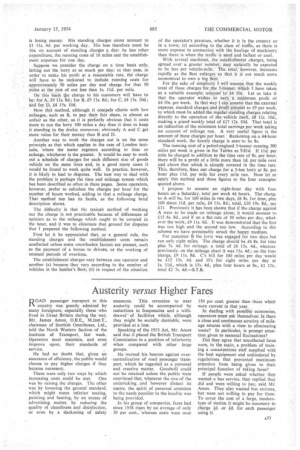Austerity versus Higher Fares R OAD passenger transport in this country
Page 67

If you've noticed an error in this article please click here to report it so we can fix it.
was greatly admired by many foreigners, especially those' who lived in Great Britain during the war, Mr. James Amos, 0.B.E., M.Inst.T., chairman of Scottish Omnibuses, Ltd.; told the North Western Section of the Institute of Transport, last week. Operators must maintain, and even improve upon, their standards of service.
He had no doubt that, given an assurance of efficiency, the public would choose to pay higher charges if they became necessary.
There were only two ways by which increasing costs could be met. One was by raising the charges. The other was by lowering the general standard, which might mean inferior seating, painting and heating, by an excess of advertising matter, by reducing the quality of cleanliness and disinfection, or even by a slackening of safety measures. This reversion to near austerity could be accompanied by reductions in frequencies and a withdrawal' of facilities which, although they might be socially desirable, were provided at a loss.
Speaking of the 1953 Act, Mr. Amos said that it placed the British Transport Commission in a position of inferiority when compared with other large groups.
• He warned his hearers against over-centralization of road passenger transport, which he regarded as a personal and creative matter. Goodwill could not be retained unless the public were convinced that, whatever the size of the undertaking , and however distant its centre, the spirit of personal attention to the needs peculiar to the locality was being provided.
In his group of companies, fares had since 1938 risen by an average of only • 30 per cent., whereas costs were over 150 per cent, greater than those which were current in that year.
In dealing with possible economies, operators Must ask themselves: Is there a close and continuous scrutiny of mileage returns with a view to eliminating waste? In partictIat, is prompt attention given to seasonal fluctuations?
Did they agree that uncollected fares were, in the main, a problem of training a conscientious staff supplied with the best equipment and unhindered by regulations that prevented maximum attention from being given to their principal function of taking fares?
If people were asked whether they wanted a bus service, they replied they did and were willing to pay, said Mr. Amos. They also wanted bus stations, but were not willing to pay for them. To cover the cost of a large, moderntype of station it might be necessary to charge id. or fd. for each passenger using it.




































































































